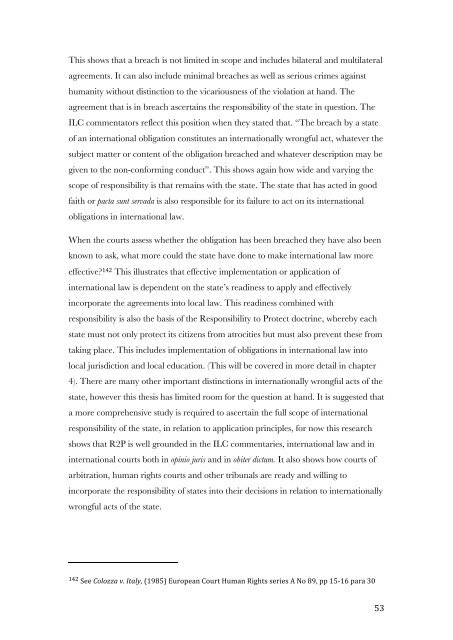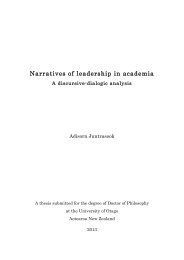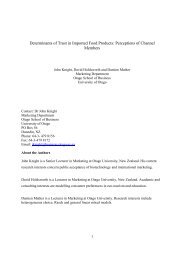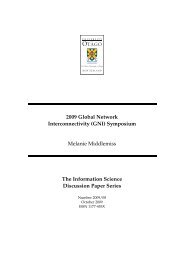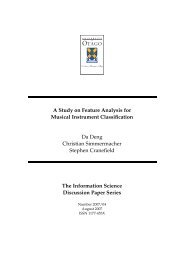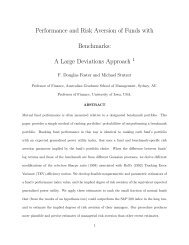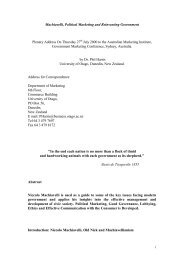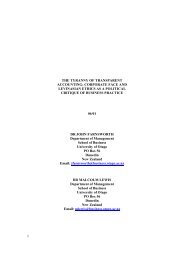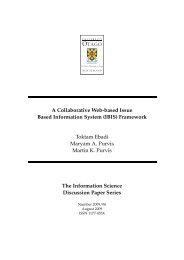Where is R2P grounded in international law? Anne-Marie Judson A ...
Where is R2P grounded in international law? Anne-Marie Judson A ...
Where is R2P grounded in international law? Anne-Marie Judson A ...
Create successful ePaper yourself
Turn your PDF publications into a flip-book with our unique Google optimized e-Paper software.
Th<strong>is</strong> shows that a breach <strong>is</strong> not limited <strong>in</strong> scope and <strong>in</strong>cludes bilateral and multilateral<br />
agreements. It can also <strong>in</strong>clude m<strong>in</strong>imal breaches as well as serious crimes aga<strong>in</strong>st<br />
humanity without d<strong>is</strong>t<strong>in</strong>ction to the vicariousness of the violation at hand. The<br />
agreement that <strong>is</strong> <strong>in</strong> breach ascerta<strong>in</strong>s the responsibility of the state <strong>in</strong> question. The<br />
ILC commentators reflect th<strong>is</strong> position when they stated that. “The breach by a state<br />
of an <strong>in</strong>ternational obligation constitutes an <strong>in</strong>ternationally wrongful act, whatever the<br />
subject matter or content of the obligation breached and whatever description may be<br />
given to the non-conform<strong>in</strong>g conduct”. Th<strong>is</strong> shows aga<strong>in</strong> how wide and vary<strong>in</strong>g the<br />
scope of responsibility <strong>is</strong> that rema<strong>in</strong>s with the state. The state that has acted <strong>in</strong> good<br />
faith or pacta sunt servada <strong>is</strong> also responsible for its failure to act on its <strong>in</strong>ternational<br />
obligations <strong>in</strong> <strong>in</strong>ternational <strong>law</strong>.<br />
When the courts assess whether the obligation has been breached they have also been<br />
known to ask, what more could the state have done to make <strong>in</strong>ternational <strong>law</strong> more<br />
effective? 142 Th<strong>is</strong> illustrates that effective implementation or application of<br />
<strong>in</strong>ternational <strong>law</strong> <strong>is</strong> dependent on the state’s read<strong>in</strong>ess to apply and effectively<br />
<strong>in</strong>corporate the agreements <strong>in</strong>to local <strong>law</strong>. Th<strong>is</strong> read<strong>in</strong>ess comb<strong>in</strong>ed with<br />
responsibility <strong>is</strong> also the bas<strong>is</strong> of the Responsibility to Protect doctr<strong>in</strong>e, whereby each<br />
state must not only protect its citizens from atrocities but must also prevent these from<br />
tak<strong>in</strong>g place. Th<strong>is</strong> <strong>in</strong>cludes implementation of obligations <strong>in</strong> <strong>in</strong>ternational <strong>law</strong> <strong>in</strong>to<br />
local jur<strong>is</strong>diction and local education. (Th<strong>is</strong> will be covered <strong>in</strong> more detail <strong>in</strong> chapter<br />
4). There are many other important d<strong>is</strong>t<strong>in</strong>ctions <strong>in</strong> <strong>in</strong>ternationally wrongful acts of the<br />
state, however th<strong>is</strong> thes<strong>is</strong> has limited room for the question at hand. It <strong>is</strong> suggested that<br />
a more comprehensive study <strong>is</strong> required to ascerta<strong>in</strong> the full scope of <strong>in</strong>ternational<br />
responsibility of the state, <strong>in</strong> relation to application pr<strong>in</strong>ciples, for now th<strong>is</strong> research<br />
shows that <strong>R2P</strong> <strong>is</strong> well <strong>grounded</strong> <strong>in</strong> the ILC commentaries, <strong>in</strong>ternational <strong>law</strong> and <strong>in</strong><br />
<strong>in</strong>ternational courts both <strong>in</strong> op<strong>in</strong>io jur<strong>is</strong> and <strong>in</strong> obiter dictum. It also shows how courts of<br />
arbitration, human rights courts and other tribunals are ready and will<strong>in</strong>g to<br />
<strong>in</strong>corporate the responsibility of states <strong>in</strong>to their dec<strong>is</strong>ions <strong>in</strong> relation to <strong>in</strong>ternationally<br />
wrongful acts of the state.<br />
142 See Colozza v. Italy, (1985) European Court Human Rights series A No 89, pp 15-‐16 para 30 <br />
<br />
53


